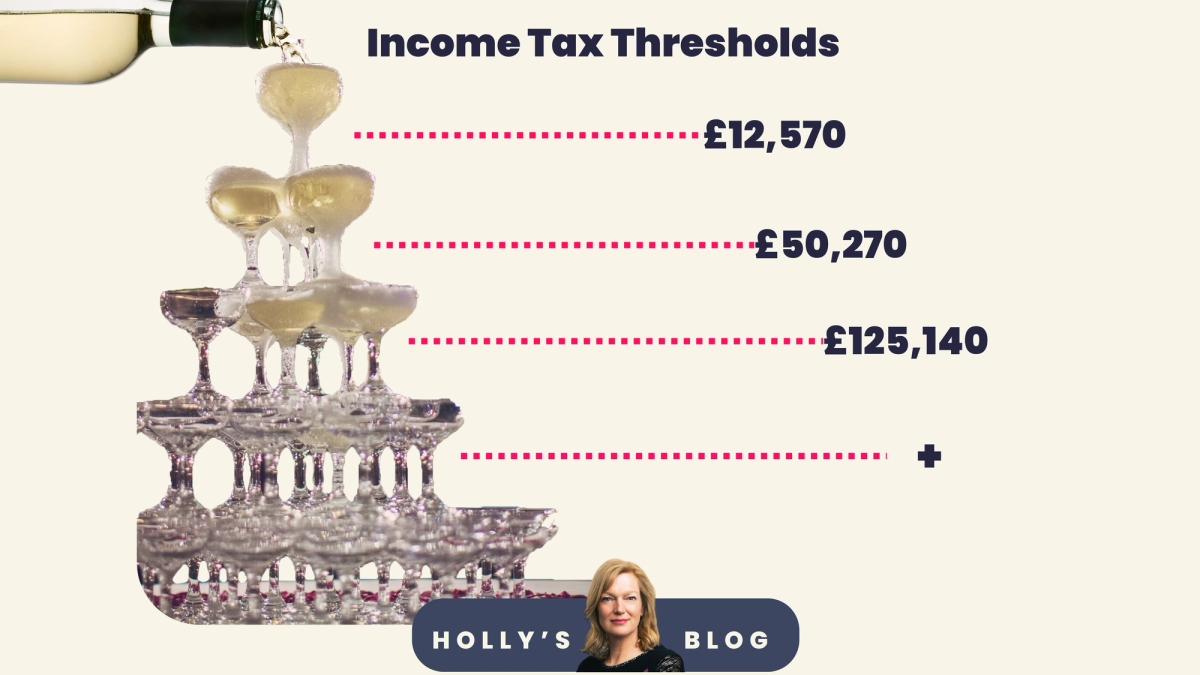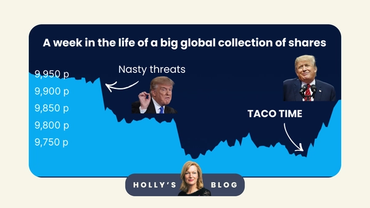Champagne Tax Towers
By Holly Mackay, Founder & CEO
14 Nov, 2025

Imagine the conversation in the Treasury. “We’ve found a way to increase taxes without increasing taxes. Working-people-who-aren’t-working-people have to cough up more. And let’s sacrifice salary sacrifice!”
“Brilliant! Let’s call Saatchi & Saatchi. Increase tax, but don’t. More for nice working people and less for nasty working people. And sacrifice sacrifice. Got it!”
The latest twist in the Budget tale is that the suggestions of increasing income tax by 2p have allegedly gone down so badly with Labour MPs that this has been shelved in favour of freezing tax thresholds for longer and potentially reducing them. I suspect this would be the higher rate tax bracket which currently kicks in at £50,270 each year.
Our Tax Beakers
Imagine we all have one of these little beakers (last seen in Fourth Form Chemistry), which we can pour up to £12,570 of income in and pay no tax. Underneath this beaker is a bigger beaker to catch any overflow. This beaker holds another £37,700 in total – this is your basic tax rate beaker and anything in here is taxed at 20%. And underneath this beaker is an even bigger one, which holds another 75 grand-ish, and this is your higher rate tax beaker. Anything in this baby is taxed at 40%. (Numbers differ for Scottish readers, but it’s the same principle.)
I would have said it’s like one of those champagne towers usually seen in a film with Leo DiCaprio nearby, but I was worried this would have set an alarm off in the Resolution Foundation think-tank, who would add a tax on champagne to the Budget – so shhhhhhh, let’s stick with Chemistry.
If you cut the higher rate threshold, for example to £40,000 (I’m making this number up for illustration purposes), then our basic rate beaker shrinks, so more of our income goes into the higher rate beaker. And we pay more, although the headline % of tax doesn’t rise. Cunning, eh?
The impact of all of this? If thresholds are frozen for longer, then 1 in 4 UK adults will be a higher-rate taxpayer by the end of the decade. And if thresholds are lowered, it's even more pronounced.
The (pleasant) Sacrificial Altar
If the Big Bang approach of increasing income tax is off the table, dozens of smaller piecemeal changes are likely. One likely victim is salary sacrifice, a little understood perk which will not have the same vitriolic backlash that changing tax-free lump sums or messing with the ‘Triple Lock’ State Pension increases would.
Salary sacrifice is a formal agreement where the employee gives up some pre-tax salary in exchange for a non-cash benefit. Which can be a pension contribution. So maybe someone on £52,000 ‘sacrifices’ £3,000 a year into a pension, reducing their taxable salary to £49,000. The employee saves on tax and National Insurance on this £3,000. The full £3,000 goes to a pension. And the employer saves by not paying 15% National Insurance Contributions (NICs) on this amount. This also means that some private sector companies pay more generous pension contributions to reflect their savings on NI.
The rumour is that salary sacrifice could be capped at £2,000 a year. The impact? For very high earning staff, this could cost their employer £1,000s more every year. But it impacts everyone at every salary level and is a disincentive to save for retirement. With unemployment hitting 5% this week, this could be another hit for employers who are still digesting the increase in NI this April. If this is the case, watch what happens to your pension contributions carefully.
Learning to love Net Adjusted Income, oh yes
In today’s climate of inevitable tax rises for us all, one tip I have for everyone is to get your heads around the concept of Net Adjusted Income, the most fiscal fun you can have with your clothes on.
Back to the champagne, I mean beakers. We can all decant a bit into a special tax-free breaker by lowering our Net Adjusted Income. How? Pensions and salary sacrifice (as it stands today).
Here’s how. If we pay into a private pension, this lowers our annual income for tax purposes. If you're hovering at that higher level tax bracket, a pension contribution can bring your income down and higher rate payers might be in line for a refund from HMRC come January. If you're a recent graduate and use salary sacrifice, you can save on NICs, but also on loan repayments. If you’re a parent at the £60,000 threshold for High Income Child Benefits, you can bring your taxable income down and protect these. And anyone lucky enough to be earning £100k - £125k-ish is paying an effective tax rate of 60% as the Treasury then starts to drill a hole in that first tax-free beaker with £12,570 in it. So, lowering your taxable income is a very sensible idea.
This could be done by someone earning above £50,270 a year who wanted to remain a basic-rate taxpayer. If you used salary sacrifice to keep your Adjusted Net Income beneath this threshold, then you retain eligibility for lower income tax, but also fall into the lower Capital Gains Tax (CGT) rate band. Geddit? So, if you need to pay CGT in any one tax year (maybe on the sale of a rental property, or selling some shares outside of an ISA), you add any taxable gain to your income and want as much of this as possible to fit into the lower rate beaker.
If you’d like to understand more on the joys of sacrifice (this blog is starting to sound like the Old Testament), this article has some worked examples and more info.
The bunny-hopping Fiscal Ford Cortina
Waiting for this Budget has become like sitting in a bunny-hopping Ford Cortina being driven by a drunk teenager. I have lost track of where we're heading. Save into a pension! But mind the tax-free lump sum rumours. Employ more people and grow the economy! But pay more National Insurance. Invest more in UK stock markets! But we’re lowering CGT allowances. Give your staff higher pensions! But we’re removing National Insurance perks for doing so. Use your ISAs more – they’re easy! But we might change cash ISAs to £12k, shares to £20k, Junior ISAs to £9k, Lifetime ISAs to £4k, and KEEP UP AT THE BACK, STUPID!
The Chancellor has an unenviable position, but the rumours and briefings and U-turns have become too much. Bring on the 26th of November, and let’s at least get some certainty back on the table.
A final look at markets…
The drunk teenager also seems to be at the wheel of markets, which continue to do well overall, but with lots of volatility and nerves about AI bubbles. We have just published October’s best-selling funds. Interestingly, the US tech-heavy S&P 500
funds – dominant for so long – are mostly missing in action, and some cash-type funds (known as money market funds) are making an entrance. Some people are clearly taking profits and de-risking a little.Over and out from me. To cool my frazzled Budget brain this morning, I had a swim in the sea AND stuck my head under. It’s still a balmy 13 degrees. Lovely!
Holly
Reader Feedback Wanted: The regulator is introducing something new in 2026 called Targeted Support. We’d love to hear from you on what you think this could be. What do you understand from that description? Please leave your thoughts in the comments box below.
Post a comment:
This is an open discussion and does not represent the views of Boring Money. We want our communities to be welcoming and helpful. Spam, personal attacks and offensive language will not be tolerated. Posts may be deleted and repeat offenders blocked at our discretion.








a factual, serious & interesting article presented with a uniquely humorous slant makes for very enjoyable reading, as well as educational. I have been reading reading your articles for quite a while and really look forward to your next endeavours. Thank you.
Ted
15 November 2025